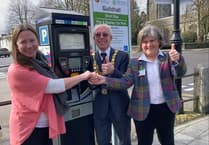Okehampton Town Council will lobby MP Mel Stride for the reopening of the minor injuries unit (MIU) in Okehampton Hospital which was ‘temporarily closed’ in 2017.
This week (July 25), the town council heard a report from Councillor Tony Leech asking that it ask Mr Stride to work towards the hospital’s reopening to allow residents to receive treatment closer to home and ease bed-blocking problems at the Royal Devon and Exeter Hospital (RD&E).
He said: ‘When I read a report from the ambulance service saying that we should have an MIU closer for our patients to access I laughed at my computer.
‘What I think we should have done is what I said in my report - we should lobby our MP. We should go to the top, it’s pointless lobbying down here and working our way up the system from what I can see.’
Cllr Leech also called for the reopening of the hospital ward which, he argued, would not only allow recovering hospital patients to move back home but enable family members otherwise unable to travel long distances, to visit their loved ones.
Since Okehampton’s hospital was closed, residents have had to travel for at least half an hour to Exeter’s RD&E - the nearest major hospital - to receive treatment.
Cllr Leech has proposed that a new MIU and hospital ward be set up within Okehampton’s hospital which would be run directly by the RD&E.
In response to Cllr Leech’s proposal, town councillors Jan Goffey and Paul Jessop voiced their support while town councillor Julie Yelland suggested that the council also contact the local health authority, NHS Devon CCG, which would be the body ultimately responsible for deciding whether to reopen the hospital.
Okehampton’s hospital used to boast a hospital ward and full maternity service which was ‘temporarily closed’ five years ago due to staff shortages.
Following a public consultation by the Northern, Eastern and Western Clinical Commissioning Group, the body then responsible for health care in the region, the hospital ward was closed after the group concluded that the town’s medical centre was capable of treating the hospital’s patients.
The proposal follows a recent report by the South Western Ambulance Service which recommends that hospitals across the area implement the triage model used by RD&E and provide better access to MIUs to reduce ambulance waiting times and relieve stress on the already over-worked health service as the country comes out of the covid pandemic.
Statistics gathered by the South Western Ambulance Service NHS Foundation Trust (SWAST) which covers Devon, Cornwall, the Isles of Scilly, Dorset, Somerset, Wiltshire, Gloucestershire and the former Avon area, has shown that it has some of the highest handover delays in England.
Data for February 2022 revealed that over 35 per cent of ambulances in the South West were delayed by 30 minutes. This was in contrast to the south of England which reported that less than 15 per cent of its ambulance were delayed by half an hour.




